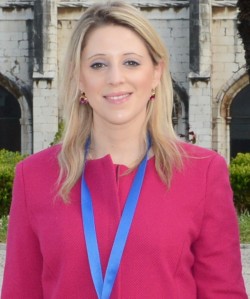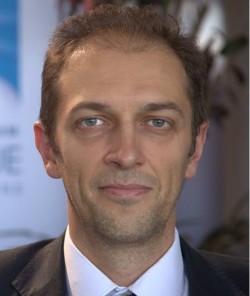Academic Event – Panel 1: Rethinking EU’s Foreign Policy
Rethinking the European Union’s Enlargement and Neighbourhod Policy: Lessons from California
Roozbeh B. Baker, University of Surrey, UK
Abstract:
The past several years have seen the clear limitations of both the European Union’s (EU) Enlargement and Neighborhood Policy (ENP). Democratic backsliding in Macedonia, Serbia and Turkey; chronic instability in Albania and Bosnia-Herzegovina; state implosion in Ukraine; and a general deterioration of civil and political rights in Armenia, Azerbaijan, Belarus, Georgia, and Moldova. All of these black marks point to a need for a fundamental rethink of the EU’s strategic vision towards the countries on its periphery and a reorganization of the ways in which it targets its considerable “soft power.” In place of varied and widely ambitious political, social, and economic targets that seek to “build up” capacity for democratic reform and the rule of law, the EU should instead refocus both its Enlargement and ENP along more simple lines that seek to set up alternative centers of democratic engagement, and indeed power, in these periphery states. Corrupt and compromised local elites (both within the government and the opposition) and the institutions they inhabit – be they in Bosnia-Herzegovina, Macedonia, or Ukraine – need to by-passed altogether. History can perhaps point the way forward for the EU. The American state of California in the early 1900s was a corrupt polity wholly owned and operated by the Union Pacific Railroad which bought and sold local politicians of all major ideological and party stripes. The corrupt and damaging hold of the Union Pacific over California state politics was only broken in the Progressive Era (c. 1900-1924) when crusading campaigners began using a little known provision of the state’s 1879 Constitution to completely destroy the influence of the Union Pacific over the state’s politics and usher in an era of democratic accountability and rule of law which, despite a few warts, the state enjoys to this day. Realizing that the state’s institutions and political actors had been completely compromised, the progressive campaigners seized on the ability, enshrined in the 1879 Constitution, to both propose / pass new legislation and indeed amend the Constitution itself through direct democracy citizen initiatives. The lesson one can learn from the California case – by-passing corrupt and compromised elites in favor of establishing alternative centers of power – is that a simple and effective tool does exist for creating the right environment for democratic accountability and the rule of law, i.e. direct democracy through citizen initiatives. This tool is a powerful one that could be used to great effect by the EU in its Enlargement and ENP should it so choose.
Inventors and Gatekeepers? The EU Member States and the European External Action Service
Monika Sus, Hertie School of Governance, Germany
Abstract:
In order to go “beyond the nation-state,” one will have to do more than set up procedures in adequate “background” and “process conditions.” For a procedure is not a purpose, a process is not a policy. (S. Hoffmann, 1966)
The emergence of Europe as a political actor on the international stage consistently attracts the interests of diverse groups of scholars. No wonder, since the challenges the EU was confronted with comprise a long list – the Ukraine crisis, current relationships with Russia, and the turmoil in the Middle East and North Africa are just present-day examples. After the financial crisis was handled, foreign policy has been elevated to the top of European agenda. The majority of scholars agree that development of the European actorness, understood as a tried-and-tested capability to join forces against issues of the highest stakes, should be perceived as a longerterm project. Though, there are different approaches on how to interpret the improvements of the last two decades in terms of the increased resource availability and growing number of instruments at the EU disposal, which have e.g. facilitated the deployment of over 30 civilian and military missions in different world regions.
This project focuses on the latest changes within the, already very complex, institutional framework of EU foreign policies that were introduced by the Treaty of Lisbon – the new-look High Representative for Foreign Affairs and Security Policy (HR) and the European External Action Service (EEAS). It reflects the ambivalence and confusion of the European member states in their relationships with the new arm of the recently created European diplomacy – European External Action Service, with the High Representative as its head. Caught in the entrapment of rhetorical support for stronger and better-coordinated EU foreign policy, the member states show little willingness to equip newcomers with political mandate and provide them with space to act. Taking into consideration the timeline 2009-2014, the project focuses on the question: how can the paradox of the relations between the member states and the EEAS be explained, and asks what the reasons were for the lack of willingness of the national capitals to give the new actors a space to act and to profile. It looks at the both patterns, dynamics of the mutual cooperation and the attitudes of the member states. The project integrates elements of comparative analyses by examining the member states’ attitudes towards the EEAS and the HR of three countries: the United Kingdom, Germany and Poland.
EU Foreign Policy by Proxy: Engagement with Civil Society
Raffaele Marchetti, LUISS Guido Carli, Italy
Abstract:
Today’s international affairs, today’s global governance are strongly characterized by the interaction between public institutions and private actors and civil society organizations. Of course, government-to-government relationships are still very important, but it is clear that a governmental or intergovernmental actor who does not take into account the different non-governmental actors is bound to fail, or at least to have harder times, in pursuing its goals. The EU is particularly engaged in developing its external action through and in partnership with civil society actors. But these are becoming more and more controversial. Ideas, people, money, political support, weapons: None of them can 100% freely cross national borders, but most of them do. Independently of, but often with the help of foreign actors. We are in a transition period, which intensified in the last 20 years, in which the boundaries of domestic and international politics are getting more and fuzzier. But we do not have clear political guidelines on how to handle this. Ukraine, Syria, Hong Kong…all cases in which foreign influence is denounced to be the source of the destabilization. All major actors practice this, all major actors denounce it.
Think about these examples:
- Russia shutting down the USAID offices in Moscow for illegitimate infiltration in domestic affairs and then providing funding to major populist movements around Europe, like the Front National in France, or indeed providing support to the fighters in the Donbas region.
- Think about China accusing foreign actors of interference during the protests in Hong Kong or in the vexed issues of Tibet and the Xinjiang Uyghur Region, but then providing generous funding for Confucius institutes abroad which are currently heatedly debated as propaganda instruments, so much as that a number of American universities are closing them down.
- In the USA, think about the recent debate on foreign funding of major think tanks (such as Brookings Institution, the Center for Strategic and International Studies, or the Atlantic Council) suggesting this entails an alignment with foreign governments’ agendas, but then consider also how the National Endowment for Democracy provides significant support for opposition forces in authoritarian countries or more concretely, as recently announced, how the government will provide military training for moderate Syrian rebels.
- Or indeed in the EU, think about the debates about the need of shutting down Mosques too close to political Islam or indeed jihadist cells, but then also providing funds to different NGOs around the world through the European Instrument for Democracy and Human Rights, the European Endowment for Democracy with, among other, the goal of constitutional changes in third countries. Or in a further twist, think about the so-called western/European fighters in Syria.
The paper provides a critical and comparative reflection on the new dynamic of foreign policy centered in the synergy between EU and civil society actors.
The EU’s Security Actorness: Towards a New Foreign Policy Strategy
Ana Isabel Xavier, Nova University, Portugal
Abstract:
When Javier Solana presented the “European Security Strategy” to the Brussels European Council of 12 and 13 December 2003, he argued that ‘as a union of 25 states with over 450 million people producing a quarter of the world’s Gross National Product, and with a wide range of instruments at its disposal, the European Union is inevitably a global player’. Therefore, ‘Europe should be ready to share in the responsibility for global security and in building a better world’. At that time, the ESS seemed to shape up the first steps of the EU’s foreign policy sustained by a security and defence player in process. In 2008, the implementation report, inspired by the Barcelona and Madrid reports, updated the strategic environment, expanded the threats and enlarged the EU’s partnerships to assure that the neighbourhood’s instability doesn’t become EU’s insecurity.
In December 2013, the European Council agreed that the security situation has been dramatically evolving and the EU’s responsibility to address even more complex and unpredictable threats such as the Islamic State of Iraq and the Levant, the illegal immigration in the southern Mediterranean or the crisis in Ukraine following Russia’s ambitions in Crimea, is growing and urges for a renewed strategy.
Aware that the EU needs a more comprehensive framework to tackle today’s challenges, the forthcoming European Council of June 2015 is, therefore, highly expected. Frederica Mogherini, the EU’s high representative for foreign affairs and security policy is likely to ask the member states for a clear mandate to present a new European Foreign Policy Strategy no later than 2016.
Therefore, this presentation will try to give to contribute to a wider discussion on the need for a new commitment among the member states to assess how the provisions of the Lisbon Treaty, namely in what concerns the Common Security and Defence Policy, might be helpful to address EU’s new security environment. For that purpose, we will discuss the deployment of military and civilian capabilities (EU’S battlegroups) as well as the defence spending of member states (GDP benchmarks, ATHENA mechanism) in an attempt to challenge the supposed declining relevance of the EU as a security provider. We will conclude that more important than a new strategy, EU Member states must focus in delivering concrete results and gather efforts in a truly common European agenda on security and defence to foster EU’s foreign policy in the neighbourhood and around the world.
Discussant:
Jozef Bátora
Moderator:
Rihards Bambals






